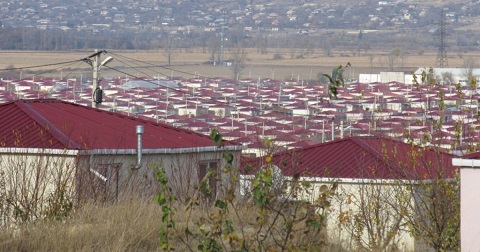Lado Bitchashvili, Shida Kartli
With the financial assistance of the EU, organization Global Initiative in Psychiatry surveyed the psychological state of the conflict affected population. According to the survey psychological problems become more evident 7-8 years after the armed conflict than during the military operations. The victims stated that the war is not only shooting and escaping the scene of military operations, it is post-war period of hopelessness and the problems, which they cannot address alone.
Head of the nongovernmental organization Step to the Future Ketevan Bidzinashvili evaluated the psycho-social state of the war-affected people still live in difficult conditions 10 years after the war. She said the victims still need psycho-social assistance.
“Meetings and interviews with the victims make this problem evident. They say that their social conditions are still grave. People, who live with permanent hopelessness, cannot resolve their daily problems. Living in permanent stress causes psychological and psychic changes. Consequently, conversation with these people reveal that they have many unresolved problems and local authority and different ministries shall assist them,” Ketevan Bidzinashvili said.
Representative of the Gori office of the humanitarian center Abkhazia Iamze Gochashvili said today the IDPs still live in difficult economic conditions and believes the state shall commence special programs to assist the IDPs to get employed and empower them.
“Ten years have passed and IDPs cannot say that anything valuable was created for them. They underwent adaptation period more or less; analyzed their new state. In the first years of displacement these people hoped that maybe they would not go back but those settlements were their temporary places of residence and expected the situation to change. When nothing was changed, the IDPs started to put up with their situation – it is my property and I will have to live here for some time; consequently they started struggle for the improvement. In IDP settlements families planted gardens, built new premises to their cottages. NGOs assisted them to improve their livelihoods: our organization Abkhazia gave them two-year loans without percent, with which part of IDPs purchased cows; another part spent money to develop agricultural farm. I cannot say that we changed much and now IDPs live in welfare but our beneficiaries say they would have lived in worse situation unless we had helped them,” Iamze Gochashvili said and added that during the first years of displacement, support from the international and nongovernmental organizations played key role in the empowerment of IDPs. However, it was not enough for long-term perspective and IDPs still live in hard conditions.
“Economic hardship is basis for social problems, which can be addressed through economic empowerment of IDP families and increase of their income so that they could keep the families. We are speaking about minimum living sources. The main problem of IDPs, like for the entire population, is unemployment. In addition to that, IDPs living in the settlements in the cities do not have plots and consequently they cannot start farming. As for working places, only small part of IDPs work in the internally displaced municipalities. Part of young men serve in the Georgian Armed Forces. Unfortunately, number of IDP teachers in the public schools has reduced regardless the state policy to keep IDP teachers in schools; years later this policy turned up ineffective and nowadays only small part of IDP teachers work in public schools. Part of IDPs are engaged in farming and their small part is involved in trading. Considering that, their economic conditions have not significantly improved and IDP families still cope with many problems,” Iamze Gochashvili said.
IDP Maka Mosiashvili from Kemerti village, Didi Liakhvi Gorge has been living in Karaleti IDP settlement for ten years already. She started interview with humanrights.ge with social problems and stated that nothing significant changed in their lives so far. Mosiashvili said cancelling the allowances for communal bills of IDPs in 2012 became a serious burden for them.
“After the government changed, attention towards IDPs has reduced. Because of cancelled allowances for communal bills IDPs are not supplied with gas because they cannot pay bills. As big part of IDPs are not employed, their main income is IDP allowance. What we have achieved so far, was the result of the assistance from international organizations. In the frame of one project we made a well in the yard and every IDP family could use it. Nowadays, unfortunately international organizations stopped similar projects and neither the state implement any programs to improve conditions of the IDPs. There are state programs but we still feel hopeless because there is little chance to win their competitions. We have questions about this program. 10 years have passed since the war and what we learned is that we have to put up with our displacement but cannot put up with social problems and try to change something. I think it will be good if the state implemented real programs to help us to start at least small business which will empower IDPs to improve their economic conditions,” Maka Mosiashvili said.
The victims of the war say that they could not receive the compensation adequate to the properties they lost in the occupied territories. Their economic-social conditions are getting worse instead improving.
News
December 13, 2023
Ethnic minorities outside the peace dialogue
November 6, 2023
‘Peace’ agenda of political parties
Popular
Articles
February 13, 2024




